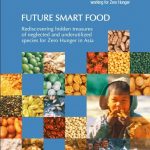
24 downloads
Title of document: Future Smart Food: Rediscovering hidden treasures of neglected and underutilized species for Zero Hunger in Asia Authors: Xuan Li and Kadambot H.M. Siddique Journal’s name if any: Ministry/Government Agency/Organisation: FAO Year of publication: 2018 Geographic focus: Asia & Mekong region Main issues / topics addressed (for example: Enabling environment required to promote future smart food production, 33 marketing and consumption; Country scoping and prioritization studies …) School of agroecology (if any): Web address to original document (if any): http://www.fao.org/documents/card/en/c/I8907EN/ Summary: For centuries people in Asia and the Pacific region have grown and consumed a wide variety of nutritious foods. Unfortunately, more recent generations have slowly but surely changed their diets and have moved away from many of these traditional foods. The Food and Agriculture Organization of the United Nations (FAO) is working with our Member Countries to reinvigorate both production and consumption of these crops – often referred to as neglected and underutilized species (NUS). This work is consistent with FAO’s role in providing support to countries to meet the targets of the Sustainable Development Goals (SDGs), primarily, but not limited to, SDG2 which aims to achieve Zero Hunger, specifically to “end hunger, achieve food security and improved nutrition, and promote sustainable agriculture” by 2030. The Zero Hunger goal implies that no one should be left behind. The Asia-Pacific region is home to most of the world’s undernourished people (490 million). Other forms of malnutrition remain challenging, including stunting and micronutrient deficiencies. While in some countries there are rising rates of overweight and obesity. The issues are manifest in both the demand side and supply side. On the demand side, there is population growth, urbanization, migration, and the changing consumption associated with rising incomes. On the supply side, the combined effects of climate change, declining agricultural biodiversity, water scarcity, land scarcity, and degradation of natural resources are threatening world food security. Read More
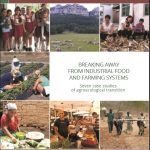
18 downloads
Title of document: Breaking away from industrial food and farming systems: Seven case studies of agroecological transition Authors: Steve Gliessman Journal’s name if any: Ministry/Government Agency/Organisation: IPES-Food Year of publication: 2018 Geographic focus: Asia & Mekong region Main issues / topics addressed (for example: The need for transition in food systems; What do we know about agroecological transitions? ; Case studies; Conclusions …) School of agroecology (if any): Web address to original document (if any): Summary: The seven case studies in this report provide concrete examples of how, in spite of the many barriers to change, people around the world have been able to fundamentally rethink and redesign food systems around agroecological principles Read More

3 downloads
Title of document: The Climate Urgency: Setting sail for a new paradigm Authors: CIDSE Journal’s name if any: Ministry/Government Agency/Organisation: CIDSE Year of publication: 2018 Geographic focus: Asia & Mekong region Main issues / topics addressed (for example: Introduction; CIDSE’S perspective and principles; WHAT ARE CARBON BUDGETS telling us about urgency?; THE ENERGY SECTOR AT THE HEART OF GLOBAL ACTION against climate change……) School of agroecology (if any): Web address to original document (if any): Summary: This report aims to explore how a paradigm shift in our food and energy systems – supported by structural lifestyle and societal changes – could greatly contribute to limit rise in average global temperature to 1.5°C without relying on risky and unproven Negative Emissions Technologies (NETs) or geoengineering Read More
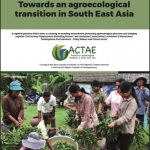
10 downloads
Title of document: A regional platform which aims at creating an enabling environment promoting agroecological practices and bringing together Civil Society Organizations (including farmers’ and consumers’ associations), Academia & Researchers, Development Practitionners, Policy Makers and Private Sector Authors: Journal’s name if any: Ministry/Government Agency/Organisation: ACTAE, CANSEA, AFD, GRET, ALiSEA, CIRAD, DALaM Year of publication: 2018 Geographic focus: Mekong regional Main issues / topics addressed (for example: Objectives of the Action; Context of the Action; Location and description of the Action…) School of agroecology (if any): Web address to original document (if any): Summary: This document presents the main findings of a Small R&D Grant awarded by CANSEA in the framework of the ACTAE project Read More
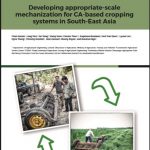
9 downloads
Title of document: Developing appropriate-scale mechanization for CA-based cropping systems in South-East Asia Authors: Chan Saruth, Leng Vira, Sar Veng, Vuthy Suos, Florent Tivet, Stephane Boulakia, Hoá Tran Quoc, Lytour Lor, Dyna Theng, Timothy Rendall, Alan Hansen, Manny Reyes, and Bunthan Ngo Journal’s name if any: Ministry/Government Agency/Organisation: ACTAE, CANSEA, MAFF, CASC, CIRAD, RUA, University of Illinois Urbana-Champaign Year of publication: 2018 Geographic focus: SEA Main issues / topics addressed (for example: Objectives of the Action; Context of the Action; Location and description of the Action…) School of agroecology (if any): Web address to original document (if any): Summary: This document presents the main findings of a Small R&D Grant awarded by CANSEA in the framework of the ACTAE project Read More
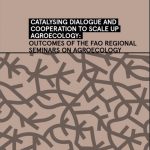
11 downloads
Title of document: Catalysing dialogue and cooperation to scale up agroecology: Outcomes of the FAO Regional Seminars on agroecology Authors: FAO Journal’s name if any: Ministry/Government Agency/Organisation: FAO Year of publication: 2018 Geographic focus: Asia & Mekong regional Main issues / topics addressed (for example: Agroecology: transitions to sustainable food systems; Agroecology for food security and nutrition: key issues from the seminars; Common recommendations from the seminars on agroecological transitions…) School of agroecology (if any): Web address to original document (if any): www.fao.org/documents/card/en/c/I8992EN/ Summary: The document is prepared in the perspective of the 2nd international Symposium in April 2018. It will give a feedback of the global FAO process on agroecology and discuss the main challenges regarding agroecology Region by Region, identifying key drivers to scale up agroecology and highlighting key initiatives undertaken in the region Read More
11 downloads
Title of document: Scaling up agroecology initiative transforming food and agricultural systems in Support of the SDGS Authors: FAO Journal’s name if any: Ministry/Government Agency/Organisation: FAO Year of publication: 2018 Geographic focus: Asia & Mekong regional Main issues / topics addressed (for example: The document responds to four key questions: “What is the potential of agroecology to contribute to the 2030 Agenda?” ; “What are the key challenges and opportunities to scale-up agroecology?” ; “Which core areas of work should the Scaling up Agroecology Initiative focus on?”; and “What is the way forward for the Scaling up Agroecology Initiative?”…) School of agroecology (if any): Web address to original document (if any): Summary: A proposal prepared for the international symposium on agroecology 3-5 April 2018 This document presents the Scaling up Agroecology Initiative, a vision to bring agroecologya to scale and transform food and agricultural systems to achieve the SDGs. The document responds to four key questions: “What is the potential of agroecology to contribute to the 2030 Agenda?” ; “What are the key challenges and opportunities to scale-up agroecology?” ; “Which core areas of work should the Scaling up Agroecology Initiative focus on?”; and “What is the way forward for the Scaling up Agroecology Initiative?”. Read More
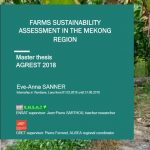
5 downloads
Title of document: Farms Sustainability Assessment in the Mekong Region Authors: Eve-Anna SANNER Journal’s name if any: Ministry/Government Agency/Organisation: GRET, ENSAT Year of publication: 2018 Geographic focus: Asia & Mekong regional Main issues / topics addressed (for example: Context of the study; Sustainability assessment of farms in the Mekong Region; Data collection; Results…) School of agroecology (if any): Web address to original document (if any): Summary: This report is divided into five parts. Firstly, an in-depth description of the context of the case study will be given, then the methodology of the study will be presented. This will be followed by an analysis of collected data, as well as subsequent results. The final part is dedicated to discussions and perspectives of the study. Read More
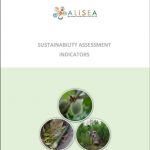
6 downloads
Title of document: ALiSEA Sustainability Assessment indicators Authors: ALiSEA Journal’s name if any: Ministry/Government Agency/Organisation: ALiSEA Year of publication: 2018 Geographic focus: Asia & Mekong regional Main issues / topics addressed (for example: Overview table of indicators per dimension and themes; Methodological sheets-Agroecological dimension; Methodological sheets-Social dimension…) School of agroecology (if any): Web address to original document (if any): Summary: The ALiSEA Sustainability Assessment Framework begins with the three dimensions of sustainability: agroecology, social and economic. These dimensions are broad, encompass many aspects and are translated into a set of themes. Each theme is measurable through indicators. SA Indicators document provides the guidance for the application and calculation of these indicators. Read More
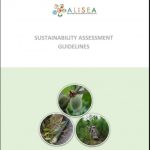
4 downloads
Title of document: ALiSEA Sustainability Assessment Guideline Authors: ALiSEA Journal’s name if any: Ministry/Government Agency/Organisation: ALiSEA Year of publication: 2018 Geographic focus: Asia & Mekong regional Main issues / topics addressed (for example: Framework: Purpose of sustainability assessment; Choice of indicators and calculation …) School of agroecology (if any): Web address to original document (if any): Summary: ALiSEA Sustainability Assessment is derived from an existing sustainability assessment tool called IDEA. The IDEA method (Indicateurs de Durabilité des Exploitations Agricoles or Indicators of Sustainable Farm Development) was created upon request of the General Board for Education and Research of the French Ministry of Agriculture which, since 1996, aims at assessing and diagnosing the sustainability of agricultural systems. The purpose of ALiSEA SA is to assess farms led by young farmers in the Mekong Region on a common framework based on the three dimensions of sustainability. Using a harmonized approach contributes to making sustainable farms more measurable, verifiable and visible. Read More

 Asia & Mekong Region
Asia & Mekong Region  Cambodia
Cambodia  Laos
Laos  Myanmar
Myanmar  Other
Other  Vietnam
Vietnam